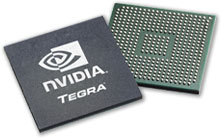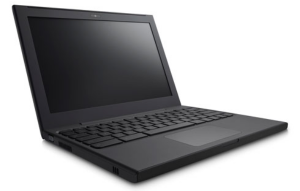Android 2.3 features near field communication (NFC) in order to allow payment through your phone as it is already implemented in Japan with FeliCa (Felicity Card), a contactless RFID smart card system from Sony, direct communication between NFC devices, RFID reader, etc… NFC is already supported in Samsung / Google Nexus S. In this blog post, we’ll see what near field communication is, which hardware is needed and what needs to be done at the software level (driver and NFC stack). What is Near Field Communication ? Extract from Wikipedia: Near Field Communication or NFC, is a short-range high frequency wireless communication technology which enables the exchange of data between devices over about a 10 centimeter (around 4 inches) distance. The technology is a simple extension of the ISO/IEC 14443 proximity-card standard (proximity card, RFID) that combines the interface of a smartcard and a reader into a single device. An NFC […]
Resources for NVidia Tegra 2
NVidia Tegra 2 is currently one of the most powerful processor used in smartphones and tablets such as the upcoming LG Optimus 2X smartphone or the new version of Samsung Galaxy Tab. NVidia describes the processor as follows: NVIDIA® Tegra™ 2 is the world’s most advanced mobile processor, featuring the world’s first mobile dual-core CPU for up to 2x faster Web browsing; the world’s only ultra-low power (ULP) NVIDIA® GeForce® GPU for up to 5x faster gaming; and the world’s first mobile 1080p HD video processor for flawless HD video conferencing and playback. Get never-before-seen experiences on a mobile device with NVIDIA Tegra. NVidia Tegra 2 is based on a dual core Cortex A9 running up to 1GHz, supports 32-bit DDR2 RAM and features NVidia Geforce GPU with OpenGL ES 2.0 support. Contrary to many other companies finding the development kit, documentations and tools is straightforward. Once you get to […]
An Update for Qualcomm Augmented Reality SDK and Extension for Unity is Available
Qualcomm has just released their new Augmented Reality SDK with Unity Support: We encourage you to upgrade immediately to the newest version of Qualcomm’s augmented reality (AR) software development kit (SDK) and Extension for Unity released today, Friday, December 17. This version includes support for virtual buttons and multi-image targets and improved stability for both the SDK and the AR Extension. Additionally, we are pleased to announce that the Qualcomm AR SDK now supports several new devices including the Dell Streak, HTC Desire HD, HTC Desire Z, T-Mobile G2 by HTC, HTC myTouch 4G, Motorola DROID 2, Motorola DROID X, and Sony Ericsson Xperia X10. Download the latest Qualcomm SDK and Extension for Unity at developer.qualcomm.com/ar AR SDK version 0.10.0 (BETA2) Changelog: Added support for multi-image target reconfiguration (add / remove / reconfigure parts on the fly) Added support for virtual button reconfiguration (add / remove / reconfigure buttons on […]
Building Archos Gen8 Source on Ubuntu 10.10
[ad#Google Adsense-Leaderboard] In a follow-up post of GPL Source code and SDE for Archos Gen8 Devices earlier today, here are the steps I followed to build the toolchain, kernel and root file system with buildroot on Ubuntu 10.10 Desktop version: Extract the source code: tar xzvf ../Downloads/gen8-gpl-froyo.tgz Install extra packages for the build: sudo apt-get install flex bison build-essential zip curl libmpfr-dev libmpfr1ldbl automake autoconf libtool gettext texinfo Run the build to generate the toolchain, kernel and root file system: cd gen8-gpl-froyo/buildroot sudo make Then wait for a while (It took 1h15 on my machine) to get the binary images: zImage (kernel) in buildroot/linux/arch/arm/boot rootfs.arm.squashfs (rootFS) in buildroot/binaries/uclibc Jean-Luc Aufranc (CNXSoft)Jean-Luc started CNX Software in 2010 as a part-time endeavor, before quitting his job as a software engineering manager, and starting to write daily news, and reviews full time later in 2011. www.cnx-software.com
GPL Source code and SDE for Archos Gen8 Devices
Right at the end of November, Archos released the first version of their Android 2.2 firmware (2.0.54). They now have also released the GPL code for this firmware. http://www.archos.com/support/download/software/sources/gen8-gpl-froyo.tgz In this package, you’ll find the following: Linux Kernel 2.6.29 buildroot – Set of tools to generate the cross-compilation toolchain, the kernel and the root file system A directory called “external” with the following libraries, tools and drivers: alsa-lib – Audio library blktrace – Driver debugging tool elfcopy – Tool to generate executable binaries grub – Bootloader iptables – Firewall Tool liblzo – LZO Compression Library webkit – Web Browser Engine alsa-utils – Audio Tools BlueZ – Bluetooth Protocol Stack elfutils – Tool to manipulate executable binaries hostapd – For Wifi Authentication jdiff – Java Code Analyzer openvpn – VPN Client/Server wpa_supplicant – Wifi tools for WPA/WPA2 bison – Parser Generator dbus – Libray and daemon for IPC (InterProcess Communication) genext2fs […]
Google Chrome Notebook Cr-48 and Chrome OS Update
After unveiling Google Nexus S and Android 2.3, Google lifted the lid on its reference notebook codenamed “Cr-48″ and provided updates about Chrome OS. This notebook features a 12.1” monitor and runs Chrome OS on an Intel platform. The Cr-48 Chrome Notebook is only designed for Chrome OS pilot program and will be distributed free of charge to selected organization and users in the United States. Here’s an excerpt from Google Chrome OS website: Each participant in the Pilot program will receive a Cr-48 Chrome notebook; in return, we’ll expect you to use it regularly and send us detailed feedback. Sound interesting? Please note: Chrome OS is for people who live on the web. It runs web-based applications, not legacy PC software. The Pilot program is not for the faint of heart. Things might not always work just right. The Pilot program is open to individuals, businesses, schools, non-profits and developers based […]
Google Nexus S and Android 2.3 (GingerBread) Unveiled
After much speculation, Google and Samsung finally lifted the lid on the Nexus S, the successor of Nexus One. It will be available for sale (unlocked) in the US on the 16th of December (Best Buy – 529 USD) and the UK on the 20th of December (Carphone Warehouse – 549.95 GBP) Samsung/Google Nexus S runs Android 2.3 (gingerbread) on a processor based on cortex A8 (Hummingbird) clocked at 1 GHz, with 512 MB RAM, 16 GB internal storage. The full specs are available on Google Nexus S page. One interesting new feature is Near Field Communications (NFC) that will allow the device to read RFIDs (e.g. for Interactive Advertising) and behave like a contact less card. So the phone might be used to make payments in the future and replace your credit/debit card. It could also be used as a contactless stored value smart card similar to the Octopus […]
What is Augmented Reality ? How to develop Augmented Reality applications ?
Now, we start to hear many smartphones or tablet pc feature Augmented Reality (AR). But what is it exactly? Are there any applications right now? How to development application making use of Augmented Reality? Augmented Reality Definition Ronald Azuma’s definition says that Augmented Reality: combines real and virtual is interactive in real time is registered in 3D Augmented Reality Applications Augmented Reality usually involves a real-life background capture (image or video) which is then going through image recognition and finally, some data is overlaid on top of this background. Here are some of applications that are available today (commercially or experimentally): PSV Eindoven has created an application to track offside at football matches. Augmented Reality Business cards can be scanned, recognized and a video presentation of the person and/or the company on the business card can be played back. Augmented Reality can help you find your way (and your holes) […]









